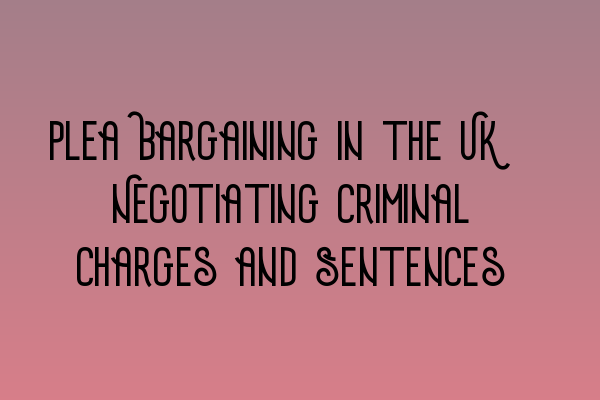Plea Bargaining in the UK: Negotiating Criminal Charges and Sentences
In the criminal justice system of the United Kingdom, plea bargaining plays a significant role in resolving criminal cases efficiently and effectively. Plea bargaining is a negotiation process between the prosecution and the defendant’s legal representative, aiming to reach an agreement on the charges and sentences.
Understanding Plea Bargaining
Plea bargaining involves discussions and negotiations between the prosecution and the defendant’s legal team with the goal of reaching a mutually acceptable resolution. It allows defendants to plead guilty to a lesser charge or specific charges in exchange for a reduced sentence or other concessions. In return, this saves both time and resources for all parties involved in the criminal justice process.
One common type of plea bargaining is charge bargaining, where the defendant agrees to plead guilty to reduced charges compared to the original ones. For example, if a defendant is charged with robbery, the prosecution may offer a plea deal for a lesser charge of theft. This negotiation can lead to a more lenient sentence and potentially avoid the need for a trial.
Sentence bargaining is another form of plea bargaining, in which the defendant pleads guilty to the original charges, but in return, the prosecution agrees to recommend a more lenient sentence. This can be advantageous for defendants who believe they have a weaker case and want to minimize potential sentencing consequences.
The Benefits of Plea Bargaining
There are several benefits to plea bargaining in the criminal justice system:
- Promotes efficiency: Plea bargaining helps reduce case backlogs and overcrowded court dockets, allowing the legal system to focus on more complex cases.
- Cost-effective: Plea bargaining saves substantial time and resources for all parties involved, including the prosecution, defense, court staff, and witnesses.
- Reduced uncertainty: Defendants can have more control over the outcome of their case by reaching a negotiated agreement rather than leaving it up to a judge or jury.
- Protects victims and witnesses: Plea bargaining can spare victims and witnesses from the potential trauma of testifying in court.
Considerations for Defendants
Defendants considering plea bargaining should carefully assess their options and consult with an experienced criminal defense solicitor. It is crucial to weigh the advantages and disadvantages of accepting a plea deal compared to the potential outcomes of going to trial.
Some factors defendants might consider include:
- The strength of the evidence against them
- The potential consequences of a guilty verdict at trial
- Any offers or recommendations made by the prosecution
- The impact on their personal and professional life
By understanding these considerations and seeking expert legal advice, defendants can make informed decisions about plea bargaining.
Conclusion
Plea bargaining is an essential aspect of the criminal justice system in the UK, providing a mechanism for resolving cases efficiently. By negotiating charges and sentences, plea bargaining allows for a more streamlined process, cost savings, and increased certainty for all parties involved.
If you are interested in learning more about criminal law and practice in the UK, we recommend checking out the following related articles:
Criminal Charges
Sentences
United Kingdom
Negotiation Process
Prosecution
Defendant
Legal Representative
Charge Bargaining
Sentence Bargaining
Efficiency
Cost-effective
Uncertainty
Victims
Witnesses
Defendants
Legal Advice
